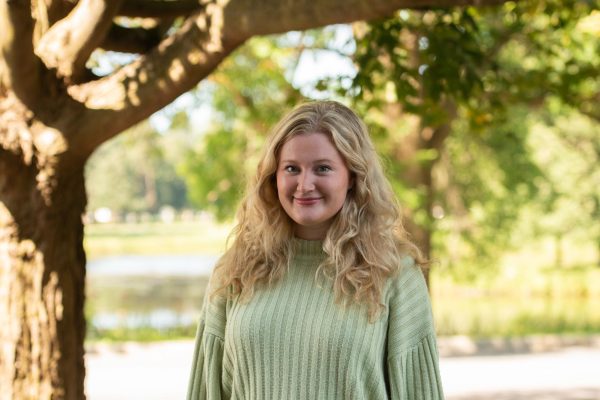Semesters Abroad Come to a Close as Omicron Cases Rise
Printed with Permission of Riley Decker
LONDON LEARNING: Students participating in the Fall 2021 London Study Group pose for a group photo on an excursion to Stonehenge.
As the number of Omicron cases rises across Europe, Colgate students abroad during the Fall 2021 semester reflect on their experiences during a global pandemic. Their return home in the coming month marks the first full completion of a semester abroad since Fall of 2019, prior to the outbreak of the pandemic.
According to Martin Wong, Associate Professor of Geology and Associate Dean of the Faculty of Global and Local Initiatives, the University currently has off campus faculty-led study groups abroad in New York City, Denmark, London, Manchester, Geneva and Madrid during the Fall 2021 semester. While an additional number of study groups were planned to run, only six study groups took place due to changing COVID-19 regulations and restrictions.
Senior Taylor Featherstone is abroad in Geneva, Switzerland with the Colgate Geneva Study Group, led by Associate Professor of Political Science Bruce Rutherford.
“I’ve had some amazing experiences abroad. Some of the highlights include paragliding through the mountains of Interlaken, Switzerland, attending the first opera [Tosca] post-pandemic closing, at the Vienna Opera House and visiting the Van Gogh Museum in Amsterdam,” Featherstone said.
Featherstone also expressed her admiration towards Switzerland’s pandemic response. In mid-October, the number of reported COVID-19 cases spiked, which prompted the country to reopen its free testing sites and approve booster availability to anyone over the age of 16. In Switzerland, 65.9% of the population is fully vaccinated according to Switzerland’s Federal Office of Public Health. Despite the rise in positive case numbers midway through the semester, Featherstone’s experience remained relatively unrestricted.
“Switzerland has been doing well with their pandemic response, but Geneva is a large place where anything could spread quickly. That being said, places of business in Switzerland are very stringent about checking our vaccination statuses, so we feel safer here,” Featherstone said. “Our academic trip to The Hague and Brussels was canceled, which was disappointing, but other than that, our academic and social lives remained relatively consistent.”
Senior Emily Moran is also on the Colgate Study Group in Geneva. Moran originally planned to study abroad in the Spring of 2021. However, her trip was postponed to the Fall semester after COVID-19 outbreaks.
“My trip was pushed to the Fall. However, many seniors did drop out of the program because it is our senior Fall. I chose to still do the program because studying abroad was something that I really wanted to do while I was in college,” Moran said. “I am an international relations major and I have not traveled much outside of the U.S., so I wanted to see if I liked being abroad.”
Moran and Featherstone both expressed their frustration with the travel restrictions that the Office of Off-Campus Study (OCS) put in place for students currently studying abroad.
“We weren’t allowed to leave Switzerland until mid-way through the semester, but our co-workers, classmates and other people we interacted with on a daily basis were able to come and go as they wanted. Most actually lived in and commuted from France, ” Featherstone said. “Colgate students were even allowed to come visit us during their fall break before they returned back to campus. If students from Colgate were allowed to vacation to France over break without completing an on-campus quarantine upon their return, why couldn’t we travel via bus for ten minutes to get our groceries in France? Thankfully, OCS allowed us to leave beginning in November.”
As of Dec. 6, Switzerland detected nine Omicron cases, according to EuroNews.
“I am a bit nervous about the new strain, but Europe has handled COVID-19 much better than the U.S. in my opinion, and the Swiss government has been very transparent about what their plans are in response to COVID-19,” Moran said.
Randy Fuller, Russell Colgate Distinguished University Professor of Biology and Environmental Studies, is currently leading the study group in Manchester, England as an interdisciplinary program in which students are able to enroll in more than 70 academic departments.
Fuller offered his insights into the invariable ways COVID-19 has shaped this semester abroad and the group’s ability to travel outside of Manchester, in comparison to other programs he has led abroad in years past.
“It has been a very different semester than the last two times I led the group in 2007 and 2009,” Fuller said. “Changes due to COVID-19 did restrict some of the trips I hoped to do, and it made it harder to do the things that I did manage to plan. The reasons are varied, but it has been a much more difficult semester.”
Fuller touched on the feelings of general anxiety surrounding the spread of the new Omicron variant, and how Colgate’s recent decision to lift the travel restrictions has impacted students’ experiences abroad.
“I do believe the students have enjoyed their time here, but it has been harder for them to travel and only recently has Colgate lifted the travel restriction outside of the U.K. I think we are all concerned about the new variant and are probably anxious about getting on a plane to head home, but the students may be less anxious and more daring than I am about traveling right now,” Fuller said. “We have enjoyed living in the city with all of the things to do and the diversity of restaurants, but given the new omicron variant, we are ready to live in the woods and hills of central New York.”
Information about the Omicron variant is still new and developing. In the United States, new travel restrictions were rolled out the morning of Dec. 6, which include tighter regulations and travel bans from South Africa, according to CNN.
“No one is really worried about getting home because we are all vaccinated and are aware of the changing restrictions. The stress of the new strain has not really affected our experience at all,” Moran said. “European and Swiss news sources are a lot less reactive and less ‘doomsday’ than U.S. news, so it has not been too stressful.”
Junior Lucy Nentwick is currently abroad in Copenhagen, Denmark, with a Colgate Study Group led by professor Teo Ballvé. Nentwick’s program was supposed to be in Wollongong, Australia, but she was forced to switch her destination abroad because of Australia’s pandemic-related visa restrictions. The Wollongong program is regularly offered as a Colgate Study Group and is designated for environmental studies (ENST) and natural sciences majors. While this is the first time the study group has been held in Copenhagen, it will once again be offered as a study group in Wollongong come Fall 2022.
“I was a little nervous about the trip being canceled before it even started, since that seemed to be common for fall trips. As for coming home, I’ve only very recently, [as of] a few days ago, become nervous about being sent home with the rising case numbers in Denmark and the presence of the new strain here,” Nentwick said.
Omicron cases in Denmark increased by 165 cases in two days, bringing the total active cases to 183 according to the Washington Post. Denmark has vigilant testing sent daily to laboratories that detect specific COVID-19 variants like Omicron.
“The only significant changes have included more restrictions from the airlines and at border patrol upon entering the U.S., but nothing too bad,” Netwick said.
Associate Director of Off-Campus Studies Cas Sowa noted an unusually high volume of students planning to study abroad this spring in a Nov. 19 issue of the Maroon-News. According to Colgate’s Off-Campus Study COVID-19 updates, “Study Group cancellation is unlikely and would occur only if external challenges such as border closures or the shutdown of partner institutions occur.”
Moran said maintaining a positive mindset amid the uncertainty of international travel complications is her biggest piece of advice for students going abroad this spring.
“Most of our group was pretty upset that we would not be able to travel outside of the country in the beginning of the program, but we made the most of it and continued to travel within Switzerland. I would make sure you are aware of the main health websites for your country and sign up for updates from that website or the government,” Moran said. “Appreciate your time abroad and just be thankful that you are still able to go and get this experience when many students were not able to.”

Payton Gore is a senior from Baltimore, MD concentrating in marine freshwater science with a minor in sociology. She has previously served as a staff writer...











